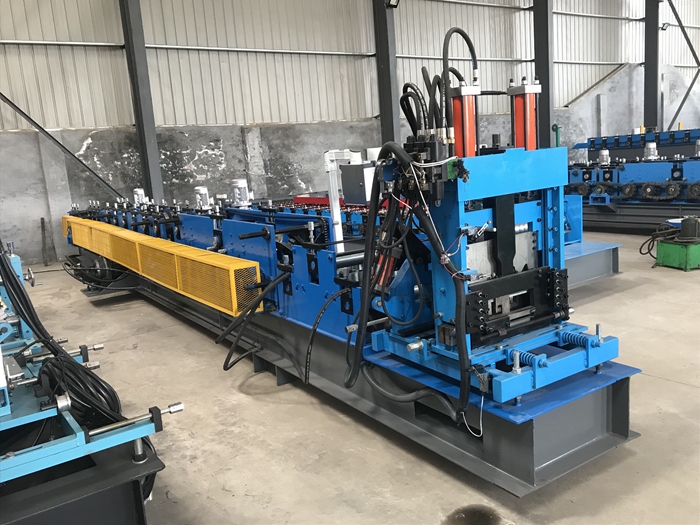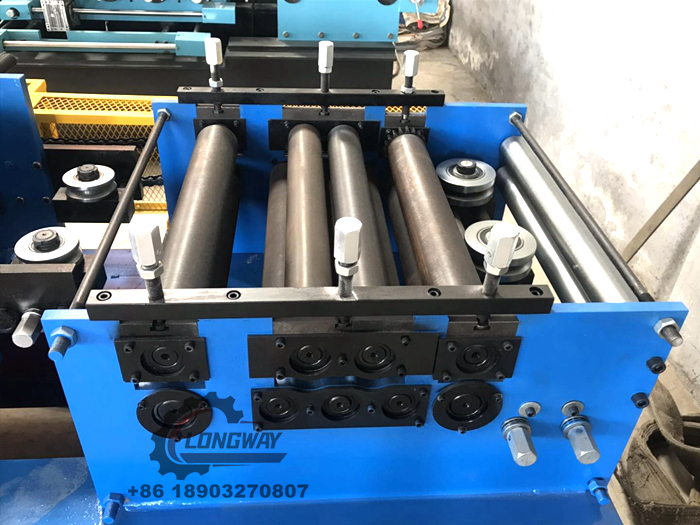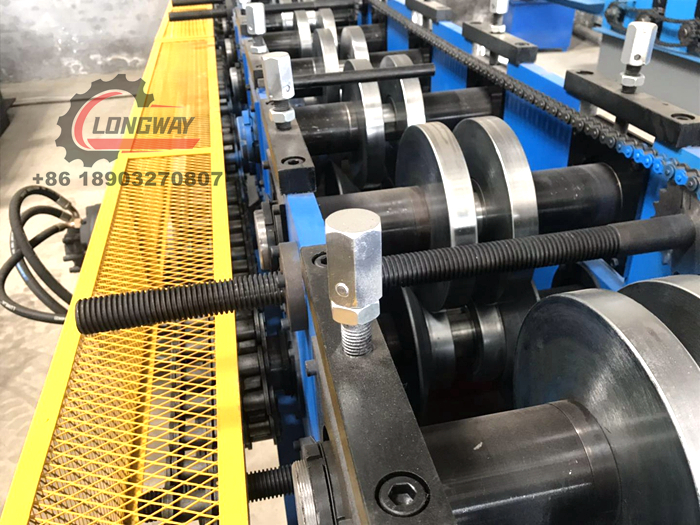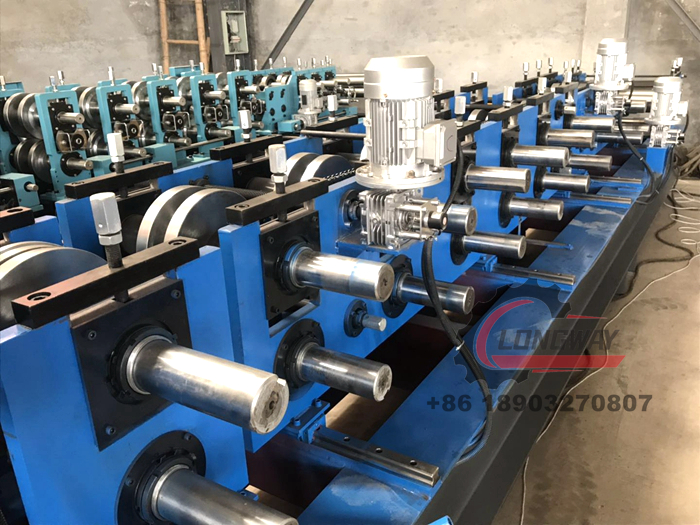Precision 3mm Steel C U Channel Roll Forming Machine
Precision Engineering for Structural Components
In the robust landscape of industrial manufacturing and construction, the demand for high-strength, precisely formed structural components is ever-growing. Central to meeting this demand is advanced roll forming technology. We delve into the capabilities and significance of the 3mm Steel C U channel roll forming machine – a critical asset for producing the foundational elements used across various heavy industries. This machine represents a pinnacle of efficiency and accuracy, transforming raw steel coils into meticulously shaped C and U channels up to 3mm in thickness, vital for applications ranging from building frameworks to complex machinery.
This detailed analysis will cover the intricacies of its operation, its profound impact on manufacturing processes, the technical advantages it confers, and its alignment with current industry trends and future demands.
Current Industry Trends in Roll Forming Technology
The roll forming industry is experiencing significant evolution, driven by the push for greater automation, enhanced material efficiency, and superior product quality. Key trends include:
- Increased Automation and IIoT Integration: Modern roll forming lines are increasingly integrated with Industrial Internet of Things (IIoT) sensors and sophisticated control systems. This enables real-time monitoring, predictive maintenance, and seamless data exchange, optimizing production schedules and minimizing downtime.
- High-Strength Steel Processing: With the construction and automotive sectors demanding lighter yet stronger components, the ability to precisely form high-strength low-alloy (HSLA) steels and advanced high-strength steels (AHSS) up to 3mm thickness is paramount. Machines capable of handling higher yield strengths (e.g., up to 550 MPa) are gaining prominence.
- Energy Efficiency: Driven by global sustainability initiatives, manufacturers are seeking roll forming solutions that consume less energy. This translates to more efficient motor designs, regenerative braking systems, and optimized tooling profiles that reduce friction.
- Customization and Flexibility: The market demands greater flexibility to produce various profiles and dimensions with minimal changeover time. Quick-change tooling systems and integrated punching/notching capabilities are becoming standard.
- Advanced Sensor Technology: Integration of laser measurement systems and ultrasonic sensors ensures precise dimension control and quality assurance, particularly crucial for complex profiles like C and U channels.
These trends underscore the importance of robust, intelligent, and adaptable machinery like the 3mm Steel C U channel roll forming machine in maintaining a competitive edge in today's demanding manufacturing environment.
Detailed Process Flow of a 3mm Steel C U Channel Roll Forming Machine
The manufacturing process of structural C and U channels up to 3mm thickness on a dedicated roll forming machine is a sophisticated sequence of operations designed for precision and efficiency. The primary product materials include hot-rolled, cold-rolled, galvanized, or pre-painted steel coils with specified yield strengths (typically 235-550 MPa) and a thickness range up to 3mm. The process ensures consistent quality, dimensional accuracy, and optimal material utilization.
Process Steps:
Steel coil, weighing several tons, is loaded onto a hydraulic or manual uncoiler. The uncoiler feeds the strip into the line at a controlled speed, often with an automatic loop control system to ensure consistent tension.
The steel strip passes through a leveling mechanism (e.g., a 7-roller straightener) to remove coil set and ensure a flat, stress-free material for optimal forming quality.
Depending on the channel design, holes or notches for fasteners, connections, or weight reduction are precisely punched using hydraulic or servo-driven presses. This often occurs pre-forming for cleaner cuts.
The core of the operation. The flat strip is progressively shaped by a series of precisely designed roller dies (typically 12-24 forming stations). Each station incrementally bends the steel until the final C or U channel profile is achieved. This gradual deformation minimizes stress and ensures dimensional stability.
The continuously formed profile is cut to precise lengths using a hydraulic or flying shear, ensuring burr-free edges and accurate piece counts without stopping the main forming process.
Finished channels are conveyed to a run-out table and then automatically or manually stacked for packaging and transport.
The components of the 3mm Steel C U channel roll forming machine itself undergo stringent manufacturing processes. Roller dies are typically fabricated from high-grade alloy tool steel (e.g., Cr12, GCr15, or Cr12MoV), heat-treated to HRC 58-62 via quenching to ensure exceptional hardness and wear resistance, significantly extending service life. Structural frames are often welded from heavy-duty structural steel and then stress-relieved and CNC machined to guarantee alignment and precision. All critical parts adhere to international testing standards such as ISO 9001 for quality management and ANSI/AWS standards for welding.
The typical service life of such a machine, with proper maintenance, can exceed 15-20 years, while consumable parts like rollers, depending on material throughput, might require replacement every 5-10 years. Target industries include:
- Construction: Structural framing, purlins, girts, studs for industrial buildings, warehouses, and commercial structures.
- Automotive: Chassis components, internal structural supports, truck bodies.
- Solar Energy: Mounting structures for photovoltaic panels.
- Material Handling: Conveyor systems, racking components.
- Petrochemical & Metallurgy: Support structures, cable trays, pipe hangers where corrosion resistance is critical.
- Water Supply & Drainage: Reinforcement components, channel liners.
In these scenarios, the channels produced offer advantages such as excellent strength-to-weight ratio (leading to energy saving in transport and installation), superior dimensional stability, and when using pre-galvanized material, inherent corrosion resistance crucial for harsh industrial environments.

Technical Specifications and Parameters
Understanding the technical specifications of a 3mm Steel C U channel roll forming machine is paramount for B2B decision-makers. These parameters dictate the machine's capacity, precision, and overall operational efficiency.
| Parameter | Specification | Notes |
|---|---|---|
| Material Thickness Range | 1.0 - 3.0 mm | Optimal for high-strength steel |
| Material Type | Cold/Hot Rolled Steel, Galvanized Steel, Pre-painted Steel | Yield strength up to 550 MPa |
| Forming Speed | 10 - 20 m/min (adjustable) | Varies with profile complexity and material |
| Number of Forming Stations | 18 - 24 stations | Ensures gradual, precise shaping |
| Main Motor Power | 15 - 22 kW (depending on configuration) | High efficiency servo motors often used |
| Cutting System | Hydraulic Post-cutting or Flying Shear | Guarantees precise length and clean cuts |
| Roller Material | Cr12 / GCr15 steel, Quenching HRC 58-62 | Ensures durability and long service life |
| Control System | PLC Control with Touch Screen HMI (e.g., Siemens, Panasonic) | User-friendly interface, high reliability |
| Line Dimensions (Approx.) | 10-15m (L) x 1.5-2m (W) x 1.5-2m (H) | Varies with uncoiler and run-out length |
| Power Supply | 380V/50Hz/3Phase or customized | Standard industrial electrical requirements |
| Precision Tolerance | Length: ±2mm; Width: ±0.5mm | Meeting strict industry standards |
These specifications are crucial for engineers and procurement managers to assess the suitability of the machine for specific production requirements and to ensure compliance with project demands.

Application Scenarios and Technical Advantages
The versatility and robustness of C and U channels produced by a 3mm Steel C U channel roll forming machine make them indispensable across a multitude of heavy-duty applications. Their unique profile offers excellent structural integrity and ease of assembly.
Typical Application Scenarios:
- Structural Framing for Industrial Buildings: Purlins and girts formed from 3mm steel are essential for supporting roof and wall panels in warehouses, factories, and commercial centers, providing robust, lightweight solutions.
- Solar Panel Mounting Structures: The channels provide the necessary strength and corrosion resistance for supporting heavy solar arrays in outdoor environments, ensuring long-term stability and performance.
- Conveyor Systems and Material Handling: For robust conveyor frames, racking systems, and storage solutions, these channels offer the high load-bearing capacity and durability required in logistics and manufacturing facilities.
- Automotive and Transportation Industry: Used in trailer frames, truck bodies, and other vehicle sub-assemblies where strong, standardized profiles are needed.
- Electrical and HVAC Infrastructure: Cable trays, duct supports, and conduit mounts benefit from the strength and formability of 3mm steel channels, ensuring secure and durable installations.
Key Technical Advantages:
- High Production Efficiency: Continuous roll forming allows for rapid production of channels at speeds up to 20 m/min, significantly reducing manufacturing lead times compared to bending or stamping processes.
- Superior Dimensional Accuracy: The multi-station forming process ensures precise control over the profile dimensions, angles, and straightness, minimizing variations and improving fit-up during assembly. Tolerances often fall within ISO 2768-1 mK.
- Optimized Material Utilization: Roll forming generates minimal scrap, as the process uses precisely calculated strip widths, leading to cost savings and environmental benefits.
- Versatility in Profile Design: The modular nature of roll forming dies allows for the production of a wide range of C and U channel sizes and web/flange configurations, adaptable to diverse project requirements.
- Enhanced Material Properties: The cold-forming process can slightly improve the yield strength of the steel in the formed areas, contributing to a stronger finished product.
- Integration of Secondary Operations: In-line punching, notching, and even embossing can be seamlessly integrated, reducing post-processing steps and costs.
These advantages contribute to lower per-unit costs, faster project completion, and higher quality end products, making the 3mm Steel C U channel roll forming machine a strategic investment for any industrial manufacturer.
Vendor Comparison and Customized Solutions
Choosing the right vendor for a 3mm Steel C U channel roll forming machine involves evaluating not just the machinery but also the vendor's expertise, support, and ability to provide tailored solutions. A robust comparison focuses on several critical aspects beyond mere price.
Key Factors for Vendor Comparison:
- Technological Sophistication: Assess the level of automation (PLC brands, HMI features), motor types (AC servo vs. standard AC), and integration of safety features (e.g., emergency stops, interlocks compliant with CE standards).
- Component Quality and Durability: Inquire about the origin and grade of critical components like bearings, electrical parts (e.g., Siemens, Schneider, Panasonic), hydraulic systems, and especially the material and heat treatment of the forming rollers. Reputable vendors use certified materials and processes.
- After-Sales Support and Service Network: A global presence for spare parts, technical support, and on-site maintenance is crucial. Response times for troubleshooting and parts delivery can significantly impact operational continuity.
- Experience and Reputation: Vendors with a long history (e.g., 15+ years in the industry) and a strong portfolio of successful installations in similar applications demonstrate authoritativeness and expertise. Look for client testimonials and industry certifications (e.g., ISO 9001, CE marking).
- Customization Capabilities: The ability to adapt the machine to specific profile dimensions, material types, line speeds, and integrate specialized punching/cutting patterns is a significant differentiator.
Customized Solutions:
A leading manufacturer understands that one size does not fit all. Customization is often key to achieving optimal efficiency and product specialization. Options for customization include:
- Profile Design Flexibility: Tailored roller dies for unique C or U channel dimensions, lip lengths, web widths, and flange angles beyond standard specifications. This includes multi-profile capabilities where one machine can produce several different profiles by changing tooling sets.
- Integrated Punching & Notching: Custom punching patterns for specific bolt holes, cutouts, or service openings, integrated directly into the line for pre- or post-punching operations.
- Material Handling Solutions: Customized uncoilers for larger coil capacities (e.g., up to 15 tons), automated stacking and packaging systems, and integration with upstream/downstream processes.
- Enhanced Automation and Control: Advanced PLC programming for specific production sequences, integration with existing factory MES/ERP systems, remote diagnostics capabilities, and advanced safety features for compliance with regional regulations.
- Increased Line Speed: Optimization of motor power, gearboxes, and roll stands to achieve higher production speeds for high-volume requirements, while maintaining profile quality.
The ability to offer these bespoke solutions is a testament to a vendor's engineering expertise and commitment to meeting client-specific demands, translating directly into higher operational efficiency and return on investment for the client.

Application Case Studies and Customer Experience
Real-world application case studies provide tangible evidence of the performance and reliability of a 3mm Steel C U channel roll forming machine. These examples highlight how tailored solutions drive client success.
Case Study 1: Large-Scale Warehouse Construction
A leading construction firm specializing in logistics and distribution centers required a high-capacity machine to produce galvanized steel purlins and girts for a series of 50,000 square meter warehouses. The challenge was to maintain tight dimensional tolerances across thousands of identical components while maximizing throughput.
- Solution: A customized 3mm Steel C U channel roll forming machine was provided, featuring an automated coil loading system, 22 forming stations with Cr12MoV rollers, and an advanced flying shear. The PLC control system was integrated with the client's material management software.
- Outcome: The client achieved a sustained production rate of 18 m/min, with a material waste rate below 1%. The consistency in profile dimensions reduced assembly time on-site by an estimated 15%, leading to significant labor cost savings and faster project completion. Customer feedback praised the machine's reliability and the vendor's quick-response technical support.
Case Study 2: Solar Farm Mounting Structures
An EPC contractor for solar power plants needed a machine capable of producing high-strength C-channels from 2.5mm steel for a new 100MW solar farm in a region prone to high winds. The channels required specific pre-punched holes for module attachments and ground anchoring, and excellent corrosion resistance.
- Solution: The machine was configured with an in-line hydraulic punching unit capable of multiple hole patterns and utilized rollers specifically designed for G450 (high-yield galvanized) steel. Comprehensive testing, including tensile strength and salt spray corrosion tests on formed samples, was conducted and certified to ISO 9227 standards.
- Outcome: The machine consistently produced channels that met the stringent structural and environmental requirements. The integrated punching saved substantial secondary processing costs and time. The client reported a 20% reduction in overall component fabrication costs compared to their previous supplier, attributing it to the machine's efficiency and precise punching capabilities.
Certification and Authoritative References:
Our commitment to quality and reliability is underlined by adherence to international standards and certifications:
- ISO 9001:2015 Certified Manufacturing: Ensuring quality management systems are in place for design, production, and service.
- CE Marking: Compliance with European health, safety, and environmental protection standards for machinery.
- SGS Audited: Independent third-party inspection for product quality and factory processes.
- Over 15 Years of Industry Service: A track record of delivering high-performance roll forming solutions to clients across Asia, Europe, and North America.

Trustworthiness: FAQ, Lead Time, Warranty, and Support
Building trust with our B2B clients is paramount. This section addresses common inquiries and outlines our commitments to service excellence for the 3mm Steel C U channel roll forming machine.
Frequently Asked Questions (FAQ):
A1: Standard configurations typically have a lead time of 60-90 working days from order confirmation. Custom designs or highly specialized integrations may extend this to 100-120 working days. We provide a detailed project schedule upon order.
Q2: What kind of warranty is offered with the machine?A2: We offer a standard 12-month warranty on mechanical components and a 6-month warranty on electrical components from the date of installation or 18 months from shipment, whichever comes first. Extended warranty options are available upon request.
Q3: Can the machine produce multiple C and U channel sizes?A3: Yes, our machines can be designed for multi-profile production, allowing for various C and U channel sizes by either manual adjustment (quick-change tooling) or automated adjustment (cassette type or rafted stands). This flexibility minimizes downtime for profile changes.
Q4: What are the power requirements and installation considerations?A4: Typically, the machine requires a 380V, 50Hz, 3-phase power supply, but we can customize electrical specifications to match local grid standards (e.g., 480V/60Hz). Installation requires a level concrete floor, adequate space for the entire line (including uncoiler and run-out), and proper utility connections. We provide detailed foundation drawings and installation guidelines.
Q5: How is after-sales support managed?A5: Our comprehensive after-sales support includes remote technical assistance via phone/video conferencing, online diagnostics, and a global network of service engineers for on-site troubleshooting, training, and maintenance. We maintain a full inventory of critical spare parts for rapid dispatch.
Lead Time and Fulfillment:
-
Corrugated iron roofing sheet making machine with CE, AutoNewsNov.17, 2025
-
3mm Steel C U Channel Roll Forming Machine, Heavy DutyNewsNov.17, 2025
-
Calamima Micro Ondulada corrugated roof sheet machine - CNCNewsNov.17, 2025
-
Metal Roofing Roll Former for Sale Companies - Fast, PreciseNewsNov.17, 2025
-
Drywall Steel L Angle Bar forming machine | Fast, PreciseNewsNov.17, 2025
-
Corrugated Iron Roofing Sheet Making Machine, Fast & DurableNewsNov.11, 2025
-
Corrugated Metal Roofing Machine | High-Speed, Precise, CENewsNov.11, 2025







